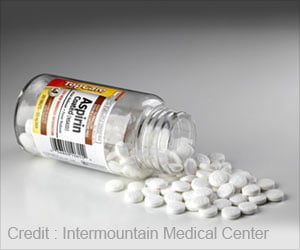While aspirin has anti-inflammatory effects in breast cancer, some women have a high risk of mortality due to DNA methylation of genes in breast cancer tumors.

‘There are real differences in the role of aspirin - to prevent or to harm, and this is explained by DNA Methylation profiles.’
Read More..




According to a new study from researchers at the University of North Carolina at Chapel Hill Gillings School of Global Public Health, the reason for this reverse effect could be explained by DNA methylation of genes in breast cancer tumors or peripheral blood.Read More..
Methylation is a chemical modification wherein a methyl group acts like light switches along the DNA molecule, turning some genetic activity on and some off. Chemical shifts in areas of DNA that are responsible for cell death, damage and repair - such as occurs in methylation - are known contributors to the development of cancer over time. Identifying the areas where these epigenetic changes take place show promise in predicting certain risks or effective methods of treatment.
The study, published in the American Cancer Society's interdisciplinary journal CANCER, is the first to examine the effect of DNA methylation in breast tumor tissues and cells circulating in the patients' peripheral blood on the association between aspirin use and mortality in women with breast cancer.
"Chronic inflammation is a key player in the development of multiple cancer types, including breast cancer," said first author Tengteng Wang, who led this study while she was a doctoral candidate in the epidemiology department at the Gillings School. "Aspirin is a major non-steroidal anti-inflammatory drug which has anti-inflammatory properties. Given this, substantial evidence from laboratory and population studies suggests that taking aspirin may reduce the risk of developing breast cancer."
However, the association of aspirin use with death outcomes following breast cancer diagnosis remains inconclusive and inconsistent across studies, which prompted the researchers to explore whether aspirin's varying influences on breast cancer patients could be related to distinctly different DNA profiles due to methylation.
Advertisement
The research team points to the need for further exploration of the potential impact - good or bad - aspirin may have on specific breast cancer patients due to their DNA methylation profiles. The findings do not indicate that anyone with elevated breast cancer risk should start taking aspirin, and people should speak to their doctors before they make changes to their medications.
Advertisement
Source-Eurekalert














